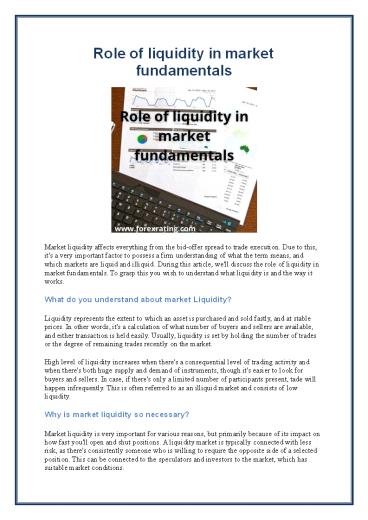Role of liquidity in market fundamentals PowerPoint PPT Presentation
Title: Role of liquidity in market fundamentals
1
Role of liquidity in market fundamentals
Market liquidity affects everything from the
bid-offer spread to trade execution. Due to this,
it's a very important factor to possess a firm
understanding of what the term means, and which
markets are liquid and illiquid. During this
article, we'll discuss the role of liquidity in
market fundamentals. To grasp this you wish to
understand what liquidity is and the way it
works. What do you understand about market
Liquidity? Liquidity represents the extent to
which an asset is purchased and sold fastly, and
at stable prices. In other words, it's a
calculation of what number of buyers and sellers
are available, and either transaction is held
easily. Usually, liquidity is set by holding the
number of trades or the degree of remaining
trades recently on the market. High level of
liquidity increases when there's a consequential
level of trading activity and when there's both
huge supply and demand of instruments, though
it's easier to look for buyers and sellers. In
case, if there's only a limited number of
participants present, tade will happen
infrequently. This is often referred to as an
illiquid market and consists of low
liquidity. Why is market liquidity so
necessary? Market liquidity is very important
for various reasons, but primarily because of its
impact on how fast you'll open and shut
positions. A liquidity market is typically
connected with less risk, as there's
consistently someone who is willing to require
the opposite side of a selected position. This
can be connected to the speculators and investors
to the market, which has suitable market
conditions.
2
In a liquid market, a seller will quickly search
for a buyer without necessarily reducing the
worth of the assets to make it look attractive.
And conversely, a purchaser wont pay a raised
amount to shield the asset they required. An
assets liquidity is additionally a most vital
thing about determining the spread which
consists of a leveraged trading provider. Higher
liquidity is defined as there is an oversized
number of orders to get and sell within the
underlying market. This enhances the probability
that the very best price any buyer is prepared to
pay and also the lowest price any seller is
prepared to require will move closer together. In
simple words, the bid-offer spread will
tighten. As we lead our prices from those within
the underlying market, a lower bid-provided
spread here will be converted into a lower
spread offered on the platform. If a market is
illiquid which implies that there's a much wider
spread. Different types of liquid assets Liquid
assets are kinds of assets that are held by
businesses or individuals. which might become
cash fastly. it'll involve cash, marketable
securities, and market instruments. All such
assets are noted down within the record of the
corporate or individual. Cash and saving
accounts normally retain the best type of
liquidity that may be posses by a business or
single person. Check here various styles of
assets that may be liquidated easily - Cash The
net amount of cash that's accessible is present
in a very type of liquidity. Cash should be
accustomed to pay any existing liabilities. Cash
available within the account is going to be
taken as a liquid it should be used for settling
obligations at any time. Accrued income The
money that we've got already earned, but the
quantity has yet not been deposited in our
associated account is accrued income. During this
case, the delayed income should be expected to
return at any time, creating it a liquid source
of funding. Cash equivalents Cash equivalents
are larger assets that include maturity ranging
to three months. It contains substantial credit
quality and may be instantly used owing because
of lack of any restriction. Commercial papers
and treasury bills are the most effective samples
of a certificate of indebtedness. Stocks A
stock's market is assessed to be liquid due to
the existence of a large number of purchasers
3
and sellers. Through the electronic market, the
owner can sell their stocks fastly. Therefore,
as per requirement, a person or company can
change equity securities into cash
faster. Continue Reading

